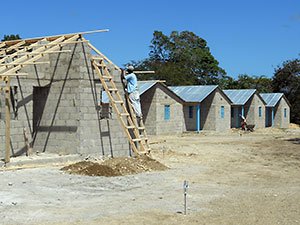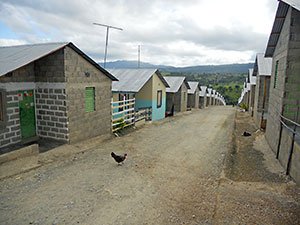
 |
|
I became interested in making this documentary after returning from the Dominican Republic, where I made several films about poverty and homelessness in a third world country. One of the films, Elio, is about a man who built over a thousand tiny homes for poor families living in shacks. On my first visit to Tent City, located in Lakewood, NJ, I met with Minister Steve. I was impressed to find out that he was not only the founder of Tent City, but he was also a resident. We talked about his vision for Tent City as well as my experience filming housing issues in the Dominican Republic. After telling him about the tiny house villages that Elio was building in the DR, he went into his tent and came out with construction plans for building a tiny house. He went on to explain his ideas for Destiny’s Bridge and his vision to build a self-sustained tiny house community for the homeless. I soon started thinking that maybe the answer to the housing crisis in the United States may be no different then it is in the poorest areas around the world where tiny houses are being built. Maybe this country needs to provide the opportunity for the poor to live a simple life with basic necessities in small houses. Isn’t it the American way to allow a person to build a house that they can afford? The biggest problem with this idea is that our society has become accustomed to creating laws and regulations that forbid people from living in small affordable houses. The fact is that people in the United States are not allowed to build small houses that they can afford on minimum wage, even if it's on their own property and they comply with all the building codes. Most zoning laws throughout the country make it illegal to build a small, affordable, energy efficient house that is eco-friendly. I will never forget my first day in Tent City. It was liberating to see so many people living in a community without using any government housing assistance. There were about 80 people living in the Lakewood homeless encampment at that time. If you do the math it would cost a million dollars a year to house them through government agencies. When you think about the six years this camp has been housing the homeless, under the direction of a full time unpaid coordinator, you soon realize that Tent City has saved taxpayers millions of dollars. There is a lot we can learn from Tent City and the concept of low cost housing for people who want to be close to nature and live without the luxuries that most people depend on. Something is very natural about the whole idea of not being sucked into the nonessentials of life that we learn to depend on at an early age and spend our entire lives paying for. During my two years filming at Tent City, I got to experience community charity like I’ve never seen before. Nothing moved me in Tent City like the site of strangers from surrounding towns visiting Tent City because they felt a need to do something. It seems like it is all part of a natural ecosystem that gives people the opportunity to bring food, clothing and items from around their house that they no longer need and give it to someone who does need it. I believe that most people want to help others; we just don’t always know how or where to go to get involved in helping less fortunate people. So, instead, we throw away good food and fill our landfills with items that are still usable. Tent City was a humane homeless shelter that focused on a sense of self-worth. The belief of the camp’s founder, Minister Steve Brigham, is that the emotional needs of a homeless person are as important as food, clothing and shelter. Unlike the way traditional shelters force the homeless out every morning to roam the streets with all their belongings, he believes that community and ownership are the first step to re-entering a homeless person back into society. Minister Steve hopes to one day build a homeless shelter called Destiny’s Bridge. His plans consist of a self-sustainable encampment in a remote area where residents receive counseling, treatment and job training in preparation to return to society. Destiny’s Bridge will be made up of tiny houses that are affordable to someone working for minimum wage. I hope this film, Destiny’s Bridge, will start conversations about new ideas for housing the homeless and open the door for change in zoning laws and minimum building requirements throughout the US. - Jack Ballo Photos from a previous film (ELIO 2010) about building small houses for homeless families in the Dominican Republic.    |
![]()